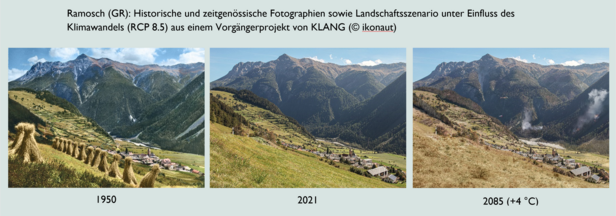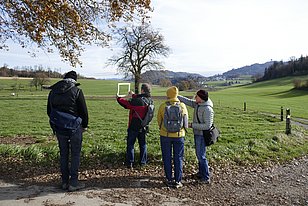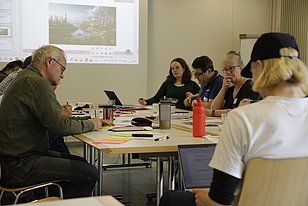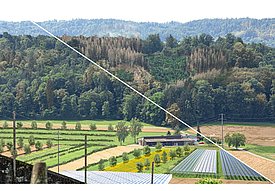Climate Change – Landscapes: designing sustainable futures (KLANG)
2023 - 2027
FinancingLandscape in a changing climate ¶
Climate change will have a major impact on Switzerland's landscapes. Numerous impacts of climate change come together and shape landscapes in interaction. Landscape is an important resource, provides numerous services for human well-being and is closely linked to a high quality of life. Many landscape services are threatened by climate change and its impacts. The project KLANG aims to contribute to a deeper understanding of the impacts of climate change on cultural landscapes. A holistic understanding of these impacts is crucial in order to grasp the ecological and social consequences of climate change. On this basis, sustainable adaptation strategies can be developed and landscapes can be preserved with their qualities and valuable services.
Methodologically, participatory scenario development is used within KLANG. Scenarios of possible future landscape developments under the influence of climate change are being developed for the KLANG case study regions, Grünes Band Bern, Lenzburg Seetal and Biosfera Val Müstair, with the participatory involvement of various local stakeholders. Scientific findings and local knowledge on landscape-relevant practices and unique landscape characteristics are taken into account. Targeted methods of participatory scenario development facilitate the dialog with local stakeholders on variety of possible futures. In this way, new knowledge is created in a transdisciplinary manner. The scenarios take into account the changing social, political and economic framework conditions as well as other driving forces of landscape change and the corresponding uncertainties. The scenarios are illustrated in pictures and stories.

Future-orientated regional processes ¶
KLANG contributes to future-orientated regional processes in three regions of Switzerland (Grünes Band Bern, Lenzburg Seetal and Biosfera Val Müstair). An integrative landscape perspective is suitable for developing solutions to complex problems such as those posed by climate change and in doing so contribute to sustainable development. A transformative social process towards sustainable living and economic activity should take place in every region. The process will start by developing local landscape scenarios for and with the regions and illustrating them in pictures or stories. These landscape scenarios serve as an entry point for developing an understanding of real-world problems in social learning processes with various social actors, developing solutions and testing these in practice. The aim is to actively and purposefully influence the future in the regions by working towards jointly developed visions.


Within the framework consisting of "future-oriented", "transformative", "landscape scenarios" and "participatory", KLANG is characterized by a high degree of openness. The exact design of the regional projects should take place in cooperation with representatives of the regions and be guided by existing needs and ideas in the region. In many regions, a wide range of processes to shape the future are already underway, so we consider it sensible not to start new projects, but to use synergies, build upon existing projects and contribute to them.
Lenzburg Seetal ¶
Co-funding: Abteilung Landschaft und Gewässer, Canton of Aargau
In 2024, the landscape project group of the Regional Planning Association Lebensraum Lenzburg Seetal decided to collaborate with researchers from the Swiss Federal Institute for Forest, Snow and Landscape Research WSL as part of KLANG in order to integrate the topic of climate change into the region's new Landscape Development Program (LEP). A process is currently underway in the region to draw up a revised LEP under the lead of the landscape project group. The LEP is a regional landscape planning instrument adopted by the municipalities, which aims to ensure the coordinated, sustainable use and development of cultural landscapes by coordinating landscape-related activities across municipal boundaries. The cooperation with KLANG should firstly ensure that climate change is taken into account as an important driver of landscape change in the various planning levels and objectives of the LEP. Secondly, the regional levers for contributing to climate protection and adaptation to climate change should be illuminated from a landscape perspective in the LEP, as this perspective supports a holistic and regionally anchored approach to the topic.
Landscape scenarios Lenzburg Seetal 2060 ¶

Landscape scenarios were developed for the two locations Beinwil am See and Gofi near Lenzburg. In collaboration with ikonaut, interactive 360° visualisations of the current and possible future landscapes and storylines, narrative descriptions of a walk through these future landscapes, were developed for both sites. Detailed information on the scenarios can be found in the following document Storylines (German only).
- Storylines with detailed information on the scenarios (German only)
- 360° visualisations
